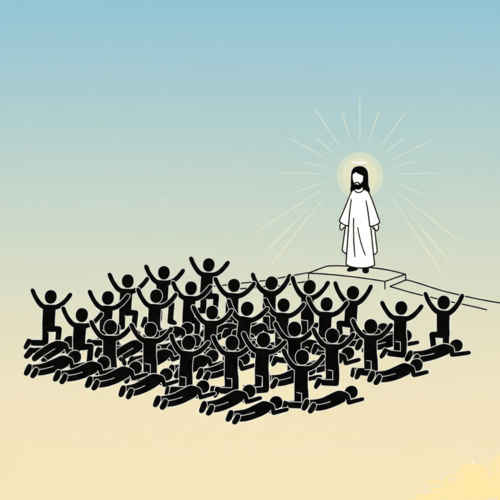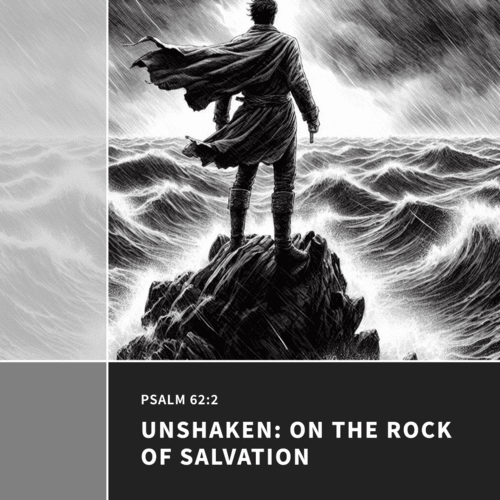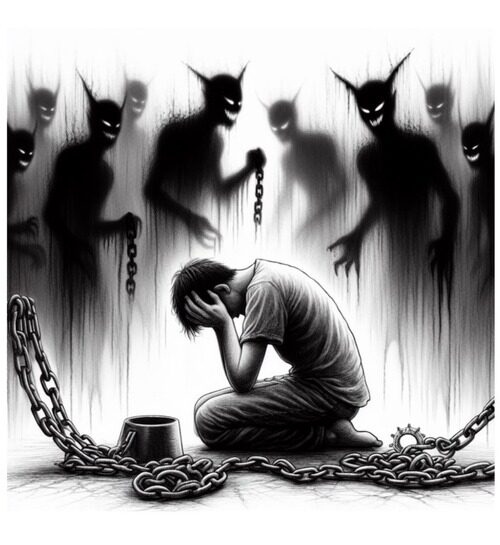Apostasy vs. Backsliding: What Happens When Sheep Stray?
A pastor sits in his study, mulling over two recent dropouts from fellowship. The first, M was once a vibrant church leader, but had walked away from the faith entirely, now claiming Christianity was a delusion he’d outgrown. Meanwhile, J, after years of dedicated service, had stopped attending worship, fallen into destructive patterns, and withdrawn from Christian community.
On the surface, the two situations may look similar—both individuals have stepped away from active faith. But are they spiritually identical? Well, from a Reformed perspective, not really.
The questions linger in many churches: What happens when professing believers walk away? Does this disprove the doctrine that salvation cannot be lost? How should we understand—and respond to—these painful situations?
TWO DIFFERENT PATHS: DEFINING APOSTASY AND BACKSLIDING
Apostasy: A Complete Abandonment
The word “apostasy” comes from the Greek apostasia, meaning “a standing away from.” In theological terms, it refers to a complete and deliberate abandonment of the Christian faith after previously professing it.
Scripture speaks soberly of this condition in Hebrews 6:4-6—a passage that has troubled many believers. Apostle John gives us a clear explanation: (1 John 2:19). And Peter provides a striking metaphor to describe apostates: “What the true proverb says has happened to them: ‘The dog returns to its own vomit, and the sow, after washing herself, returns to wallow in the mire.'” (2 Peter 2:22)
Backsliding: A Temporary Regression
Unlike apostasy, backsliding refers to a temporary spiritual regression in the life of a genuine believer. It’s a drifting away, not a complete abandonment—a season of spiritual coldness, disobedience, and perhaps, even waywardness.
God addresses this condition tenderly in Jeremiah: “Return, O backsliding children, and I will heal your backslidings” (Jeremiah 3:22). Scripture is filled with examples of true believers who experienced serious spiritual failings:
- David’s adultery and murder (Psalm 51)
- Peter’s denial of Christ (Luke 22:31-32)
- The prodigal son’s rebellion and return (Luke 15)
Each of these examples shows something profoundly different from apostasy—they demonstrate temporary failure, followed by genuine repentance and restoration.
PERSEVERANCE OF SAINTS: THE REFORMED FOUNDATION
To understand the difference between apostasy and backsliding, we must grasp the doctrine of the perseverance of the saints—the “P” in the Reformed TULIP acrostic.
This doctrine doesn’t simply teach “once saved, always saved” as it’s sometimes caricatured. Rather, it affirms that those whom God has genuinely saved will persevere in faith until the end—though not without struggles, failures, and even seasons of serious sin.
This security rests not on human effort but on God’s sovereign work:
- The Father’s sovereign election: “He chose us in him before the foundation of the world” (Ephesians 1:4)
- Christ’s perfect atonement: “I give them eternal life, and they will never perish, and no one will snatch them out of my hand” (John 10:28)
- The Spirit’s sealing work: “In him you also, when you heard the word of truth, the gospel of your salvation, and believed in him, were sealed with the promised Holy Spirit” (Ephesians 1:13)
The Westminster Confession of Faith beautifully expresses this truth: “They, whom God hath accepted in his Beloved, effectually called, and sanctified by his Spirit, can neither totally nor finally fall away from the state of grace, but shall certainly persevere therein to the end, and be eternally saved.”
APOSTASY THROUGH REFORMED EYES: NEVER TRULY KNOWN
If salvation cannot be lost, how do we explain those who appear to have been believers but later reject the faith entirely?
The Reformed answer is direct: they were never truly regenerate in the first place. Their profession was genuine in the sense that they sincerely believed themselves to be Christians, but they never experienced the supernatural work of regeneration.
This isn’t mere theological convenience—it’s precisely what Scripture teaches (Matthew 7:21-23). Note Christ’s words: “I never knew you”—not “I knew you once but no longer.” The relationship never truly existed.
Jesus’ parable of the sower further illustrates this reality. Some seed falls on rocky ground, springs up quickly, but withers when tribulation comes; other seed falls among thorns and is choked by the cares of the world (Matthew 13:20-22). These represent people who respond positively to the gospel but don’t persevere—because they never had genuine saving faith.
As John Calvin wrote, “Experience shows that the reprobate are sometimes affected by almost the same feeling as the elect, so that even in their own judgment they do not in any way differ from the elect.”
BACKSLIDING: WHEN TRUE BELIEVERS FALL
While apostates were never truly saved, backsliders are genuine believers experiencing a season of spiritual regression. This isn’t to minimise the seriousness of their condition—Scripture warns sternly against the dangers of drifting (Hebrews 2:1) and the deceitfulness of sin (Hebrews 3:13).
When true believers backslide, they experience God’s fatherly discipline (Hebrews 12:6). Unlike apostasy, backsliding is marked by:
- The continuing work of the Holy Spirit, who convicts of sin (John 16:8)
- A growing sense of misery in sin rather than comfort in it
- An eventual return through repentance
Consider Peter’s denial of Christ—a serious failure by any measure. Yet Jesus had prayed for him: “I have prayed for you that your faith may not fail. And when you have turned again, strengthen your brothers” (Luke 22:32). Christ’s words “when you have turned again” show His confidence in Peter’s restoration.
APOSTASY VS. BACKSLIDING: DISTINGUISHING BETWEEN THE TWO
How can we tell the difference between apostasy and backsliding? While only God knows the heart with certainty, Scripture provides some guidance:
- Rejection of fundamental Christian doctrines
- Confident dismissal of previously held beliefs
- Absence of struggle or grief over departure from faith
- Progressive hardening toward spiritual things
Signs of Backsliding:
- Ongoing spiritual struggle and internal conflict
- Periods of conviction and remorse
- Responsiveness to loving confrontation
- Continued, if inconsistent, spiritual hunger
Scripture calls us to respond differently to each: For the backslider, gentle restoration is required (Galatians 6:1 and Jude 23).
FINDING COMFORT IN THE DOCTRINES OF GRACE
Understanding these distinctions provides comfort to believers struggling with doubt or sin. The security of salvation doesn’t rest on our perfect performance but on God’s perfect faithfulness.
If we’re experiencing spiritual dryness, struggling with persistent sin, or feeling distant from God, these are not necessarily signs that we were never saved. They may simply be evidence that we’re a normal Christian experiencing the common struggles of sanctification.
The true believer can rest in this promise: “He who began a good work in you will bring it to completion at the day of Jesus Christ” (Philippians 1:6). God doesn’t start what He doesn’t finish.
APOSTASY VS. BACKSLIDING: A CALL TO WATCHFULNESS AND HUMILITY
While the doctrine of perseverance provides assurance, it never promotes complacency. Scripture consistently calls believers to “work out your own salvation with fear and trembling” (Philippians 2:12) and to “be all the more diligent to confirm your calling and election” (2 Peter 1:10).
For those currently wandering, the message is clear: God’s arms remain open. “Return, O backsliding children, and I will heal your backslidings.” For those watching loved ones wander, continue in faithful prayer and gentle witness. Many a “prodigal” has returned after years of what seemed like apostasy. In all cases, we rest not on human faithfulness but on the unfailing faithfulness of our covenant God, who promises: “I will never leave you nor forsake you” (Hebrews 13:5).
APOSTASY VS. BACKSLIDING: RELATED FAQs
How might understanding these distinctions change how we view our own seasons of spiritual dryness? Understanding the difference between apostasy and backsliding helps us avoid unnecessary panic during spiritual dry seasons. Temporary struggles with doubt, sin, or spiritual apathy are normal parts of the Christian journey, not evidence that our faith was never real. This knowledge allows us to approach our spiritual struggles with honesty before God, seeking renewal rather than questioning our salvation entirely.
- In what ways can the church better minister to those who’re backsliding? Churches can better minister to the backsliding by creating safe spaces for honesty about spiritual struggles without immediate judgement. Implementing intentional discipleship relationships provides accountability and encouragement during difficult seasons. Churches should also emphasise God’s restorative grace rather than merely condemning sin, while still maintaining biblical standards of holiness.
- How does the doctrine of perseverance provide comfort to believers who struggle with doubt? The doctrine of perseverance reminds doubting believers that their salvation depends on God’s faithfulness, not the strength of their feelings or performance. It assures us that genuine faith, while it may struggle and even falter temporarily, will ultimately endure because of God’s preserving grace. This truth allows believers to honestly acknowledge their doubts without fearing that momentary uncertainty has nullified their salvation.
What warning signs in life might indicate spiritual drift that requires attention? Warning signs of spiritual drift include decreasing interest in Scripture, prayer, and fellowship with other believers. Growing comfort with sin, increasing worldliness in values and priorities, and defensive reactions to gentle spiritual correction are additional red flags. Spiritual drift often begins subtly with schedule changes that reduce spiritual disciplines, followed by attitudinal shifts that rationalise these changes as acceptable.
- Can someone who has completely renounced the faith ever come back? While Scripture speaks soberly about apostasy, we cannot definitively determine who has crossed that line in this life. Some who appear to have completely abandoned faith later return, revealing that what appeared to be apostasy was actually severe backsliding. We should continue to pray for and lovingly engage those who have walked away, leaving final judgment to God who alone knows the heart.
- Does Reformed theology teach that Christians should never doubt their salvation? Reformed theology doesn’t teach that Christians should never experience doubt, but rather that genuine believers will persevere through their doubts by God’s grace. The Westminster Confession acknowledges that believers may “have the assurance of their salvation diverse ways shaken, diminished, and intermitted,” yet will never fall into utter despair. Healthy self-examination is encouraged in Scripture and can actually strengthen genuine faith.
How should I respond to a loved one who seems to be abandoning their faith? Respond to a potentially apostatising loved one with unwavering prayer, gentle truth-telling, and patient love that reflects God’s pursuit of the wandering. Avoid both harsh condemnation that pushes them further away and silent approval that confirms their new direction. Remember that only God knows whether they are experiencing temporary backsliding or true apostasy, so maintain relationship when possible while standing firm in your own faith commitments.
APOSTASY VS. BACKSLIDING: OUR RELATED POSTS
Editor's Pick

The Christian Sabbath: Why Did Sunday Replace Saturday?
Consider this: God-fearing Jews who’d faithfully observed Saturday Sabbath for over a thousand years suddenly began gathering for worship on [...]

Did the Early Christians Worship Jesus? The Biblical Evidence
It was a startling transformation: Jewish fishermen who'd spent three years following this itinerant carpenter from Nazareth now begin to [...]

If Jesus is Messiah, Why Aren’t ALL Messianic Prophecies Fulfilled?
If Jesus is truly the Messiah, why hasn't world peace arrived? Why do Jews still face persecution? Why isn't the [...]

When Courage Fails: Will I Be Forgiven If I Deny Christ in Persecution?
The rooster crowed, and Peter remembered. In that devastating moment, the apostle realised he’d just done the unthinkable—three times he’d [...]

What Makes a Godly Dad? 5 Biblical Principles Fathers Need
Modern culture sends fathers mixed messages. Be strong but sensitive. Be involved but not overbearing. Lead but don’t dominate. With [...]

What Makes a Godly Mom? A Scripture-Backed Guide
In our culture’s confusion about gender roles and parenting, the timeless question remains: what makes a godly mother? While secular [...]

Paul’s Mandate for Men: Headship Or Servant Leadership? Or Both?
Modern Christianity has fallen into a trap. We've created an either/or battle between "headship" and "servant leadership," as if these [...]

Should We Stop Using Male Pronouns for God? Why Do We Say No?
A friend of ours arrived eagerly at his first theology class in seminary. But he quickly discovered something troubling: the [...]

Did Old Testament Law Force Women to Marry their Rapists?
**Editor’s Note: This post is part of our series, ‘Satan’s Lies: Common Deceptions in the Church Today’… Viral misinformation abounds [...]

From Danvers To Nashville: Two Statements, One Biblical Vision
30 years separate the Danvers Statement on Biblical Manhood and Womanhood (1987) and the Nashville Statement on Human Sexuality (2017). [...]
SUPPORT US:
Feel the Holy Spirit's gentle nudge to partner with us?
Donate Online:
Account Name: TRUTHS TO DIE FOR FOUNDATION
Account Number: 10243565459
Bank IFSC: IDFB0043391
Bank Name: IDFC FIRST BANK






